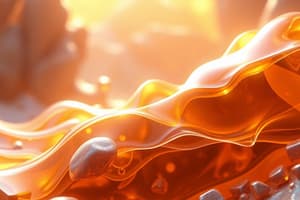Podcast
Questions and Answers
Quel matériau est un isolant thermique supérieur en raison de sa structure moléculaire remplie d'air ?
Quel matériau est un isolant thermique supérieur en raison de sa structure moléculaire remplie d'air ?
- Le cuivre
- Le PET
- Le polystyrène expansé (correct)
- Le polyéthylène
Quel est le matériau transparent et solide couramment utilisé comme substitut au verre ?
Quel est le matériau transparent et solide couramment utilisé comme substitut au verre ?
- Le polyéthylène
- Le PET
- Le polycarbonate (correct)
- Le PMMA
Quel matériau est léger, flexible et résistant à la chaleur et aux produits chimiques ?
Quel matériau est léger, flexible et résistant à la chaleur et aux produits chimiques ?
- Le polystyrène expansé
- Le polyéthylène (correct)
- Le cuivre
- Le PMMA
Quel matériau est couramment recyclé et utilisé pour l'emballage alimentaire et des boissons ?
Quel matériau est couramment recyclé et utilisé pour l'emballage alimentaire et des boissons ?
Quel matériau est dur et transparent avec une large gamme d'utilisations ?
Quel matériau est dur et transparent avec une large gamme d'utilisations ?
Quels sont les différents types de propriétés que les plastiques peuvent avoir ?
Quels sont les différents types de propriétés que les plastiques peuvent avoir ?
Dans quels types de produits les plastiques peuvent-ils être utilisés ?
Dans quels types de produits les plastiques peuvent-ils être utilisés ?
Flashcards are hidden until you start studying
Study Notes
- Plastic materials have low thermal conductivity due to irregularities in their molecular structure.
- Copper conducts heat 2,400 times faster than plastic.
- Polystyrene foam, which is 98% air, is an even better insulator.
- Polycarbonate is a transparent and strong plastic commonly used as a substitute for glass.
- Polyethylene is a lightweight and flexible plastic with high resistance to heat and chemicals.
- PET is a commonly recycled plastic used for food and beverage packaging.
- PMMA, also known as acrylic glass or Plexiglas, is a hard and transparent plastic with a wide range of uses.
- Plastics are used in a variety of products such as CD/DVDs, combat shields, bottles, furniture, and more.
- Plastics have different properties such as rigidity, flexibility, translucency, and resistance to heat and chemicals.
- Plastics can be recycled.
Studying That Suits You
Use AI to generate personalized quizzes and flashcards to suit your learning preferences.




